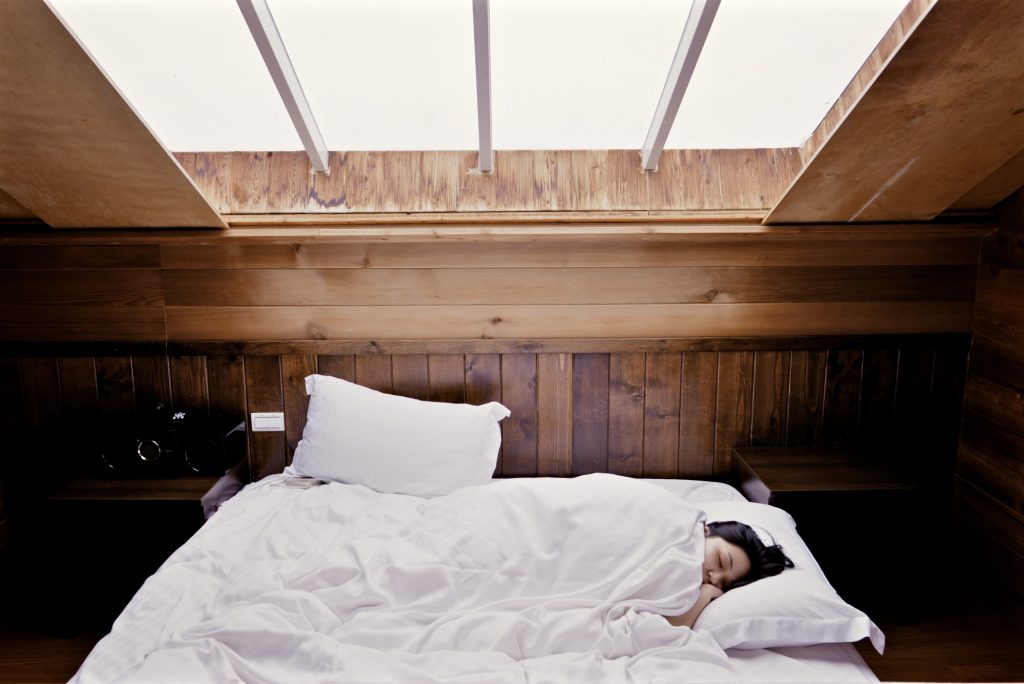Get Your Z’s: 13 Simple Tips to Sleep Peacefully
Do you get the recommended 7 to 9 hours of sleep each night?
If not, you’re not the only one wide awake at night when you want to sleep peacefully. Research shows that 30% of adults deal with insomnia and 35.5% get less than seven hours of sleep per night.
It’s not just the amount of sleep that’s important. If you toss and turn or wake up frequently, you’ll still wake up feel groggy. Lack of sleep can affect your thinking and cause physical side effects.
Little changes in your bedroom and in your routine can help you fall asleep faster. It can also make it easier to stay asleep so you can reach the deeper stages that help you feel rested.
If your sleep isn’t peaceful, try these 13 tips to improve it.
Contents [hide]
1. Enjoy Bright Light During the Day
Pull up your blinds as soon as you get out of bed to embrace the sunlight. Natural light supports the circadian rhythms that tell your body when to sleep and when to stay awake. Being in bright sunlight during the day sends the signal to your body that you should be awake and using energy.
Brighter days can lead to sleepier nights. You may find you get better quality sleep and stay asleep for longer when you get plenty of light during the day.
2. Limit Light at Night
As you near bedtime, you want your body to understand it’s almost time to sleep. Being around bright lights at night can confuse your body into thinking it’s daytime and that you should be awake. Dimming the lights in your home helps signal to the brain that it’s time to rest.
Blue light that comes from all types of electronic screens is particularly damaging to your sleep. Limiting your screen time at night helps.
You can also use built-in blue light blockers that come on many laptops and phones. If your phone doesn’t have the option built in, you can download apps designed to block the blue light. You can also get special glasses that block blue light to wear at night.
3. Be Consistent
Your body work well on routines. If you go to sleep and wake up at random times every day, your body doesn’t know what to do. Setting a sleep schedule and sticking to it, even on weekends, helps your body get into a rhythm that can help you sleep better.
Irregular sleep patterns can affect your body’s production of melatonin, a chemical that helps you sleep. It can also throw off your circadian rhythm. Waking up consistently at the same time, even on weekends, gets your brain into a rhythm it can repeat to improve your overall sleep.
4. Limit Napping
Poor sleep at night can leave you craving naps to catch up your rest. But sleeping during the day can throw off your nighttime sleep. That continues the cycle of poor sleep at night followed by more napping during the day.
If you can get by without a nap, you may be able to get back on track at night. If you need a nap, keep it short and sweet, sleeping no longer than 30 minutes. Sleeping too long during the day confuses your body and may throw off your sleep schedule, or you may end up feeling even sleepier during the day.
5. Find the Right Mattress
Your mattress and pillow directly impact your comfort at night, which can either make sleep peaceful or difficult. If your mattress is old or doesn’t feel comfortable to you, consider getting a new one.
Your sleeping position can influence the best mattress choice. The best mattress for side sleepers may not feel as comfortable for people who sleep on their back. You might prefer a mattress that’s firm or one that’s softer.
Some people prefer memory foam mattresses, which often have a cooling effect. Others prefer traditional coil mattresses. Test out different types of mattresses to find one that makes you feel comfortable.
If your pillow doesn’t support your head comfortably, try a different one. The thickness, material, and firmness all affect how a pillow feels to you. Since they’re relatively inexpensive, new pillows are an easy change that could help you sleep better.
6. Stay at the Right Temperature
A room that’s too hot or too cold can make sleep difficult. A commonly suggested range is 60 to 67 degrees Fahrenheit for comfortable sleep. Play with the temperature within the range to find out what works best for you.
Adjust your thermostat at night based on your preferred sleeping temperature. If your thermostat is programmable, set it to automatically adjust shortly before your bedtime.
Changing your bedding is another way to control the temperature. Choose different sheets or blankets based on the time of year. Cooler sheets help you sleep more comfortably in the summer while flannel sheets keep you warmer in the winter.
Even your pajamas affect your temperature and comfort. Wearing long sleeves and long pants may cause you to overheat. If you wear lighter pajamas, you can easily adjust your blankets if you feel hot or cool.
7. Improve Your Sleep Environment
If you have trouble falling asleep or you wake up frequently, look around your bedroom to see if the environment is to blame. Lights and noise are two common things that can interfere with your sleep.
If light is an issue, consider hanging blackout curtains. This can help with both light and noises that come from outside your home. A white noise machine or a fan running and night can also block out sounds to help you sleep better.
Items in your room, such as your alarm clock or TV, may also produce light. Dim those lights when possible, or arrange them in your room so the light isn’t as noticeable from your bed.
8. Exercise Regularly
Working up a sweat during the day can help you wind down faster at night to improve your sleep. Researchers aren’t quite sure exactly why exercise helps you sleep better, but people who get moderate exercise tend to spend more time in a deep sleep.
That deep sleep is important in making you feel rested when you wake. It’s the type of sleep that helps rejuvenate you so you feel refreshed.
Some people notice more difficulty falling asleep when they work out close to bedtime. Exercise releases endorphins, which have a stimulating effect and can make you more alert. You may have trouble winding down and falling asleep if you schedule late-night exercise sessions.
9. Ease Anxiety
Stress and anxiety keep your mind racing and can make it difficult to fall asleep. Practice relaxation and stress reducing exercises to clear your mind before bed. You might meditate, use visualization, or practice deep breathing.
If you lie awake thinking about the next day, consider setting aside time earlier in the evening to plan. Work through any scheduling issues or work plans for the following day. Set out clothes and anything else you need the next day earlier in the evening so you can feel prepared and relaxed when you go to bed.
10. Time Your Caffeine Right
If you rely on caffeinated beverages to boost your energy during the day, know when to cut yourself off. Caffeine has a half life of 3 to 6 hours, which means it takes that long to get rid of half of the caffeine you consume. If you drink caffeinated beverages even several hours before bedtime, it could still affect your sleep.
Drink any caffeinated beverages early in the day so you body has time to eliminate it well before bedtime. Don’t forget that chocolate also has caffeine.
Alcohol can also interrupt your sleep. It may make you feel drowsy, but it often causes you to wake up frequently during the night, which means you can’t get the restful sleep you want.
11. Limit Bedroom Activities
Turning your bedroom into a multi-purpose space can interfere with your sleeping. Reserve your bedroom, and specifically your bed, for sleeping and intimate activities. Using it for working, studying, watching TV, or other potentially stimulating activities can make sleep more difficult.
12. Start a Relaxing Routine
Strategically picking relaxing activities leading up to bedtime puts you in a calm mindset that can support sleep. Consider what types of activities make you feel most relaxed and calm.
Ideas include a shower, bath, relaxing music, gentle yoga poses, or reading. Certain scents, such as lavender, are also relaxing. Use essential oils or other scented products in those soothing scents to help you relax.
Try to get into the same routine each night. Your mind and body get used to that routine. It’s a signal that it’s time to sleep.
13. Visit Your Doctor
If you’re still having trouble sleeping soundly at night, it may be time to visit your doctor. You may have an undiagnosed health condition or sleep disorder that’s interfering with your rest.
Be prepared to answer questions about your sleep problems. Your doctor may ask about your daytime habits, too.
Learn to Sleep Peacefully
Getting restful sleep takes practice and intentional control over your sleeping environment. Small changes can help you sleep peacefully so you feel rested all day. Check out more of our lifestyle blog posts for more advice on improving sleep and improve your life.




